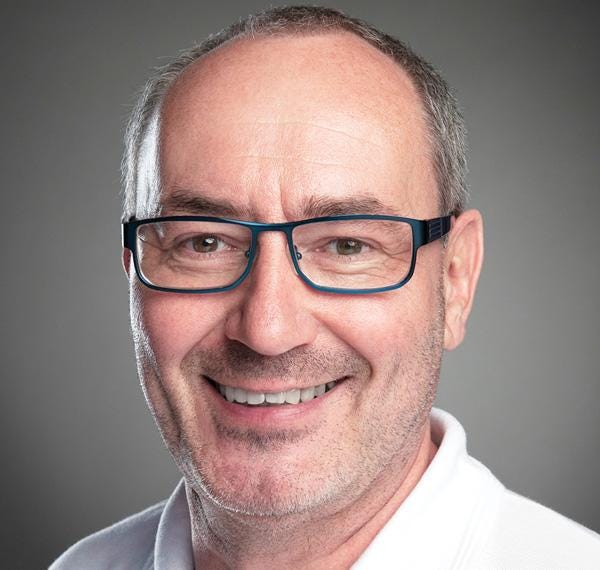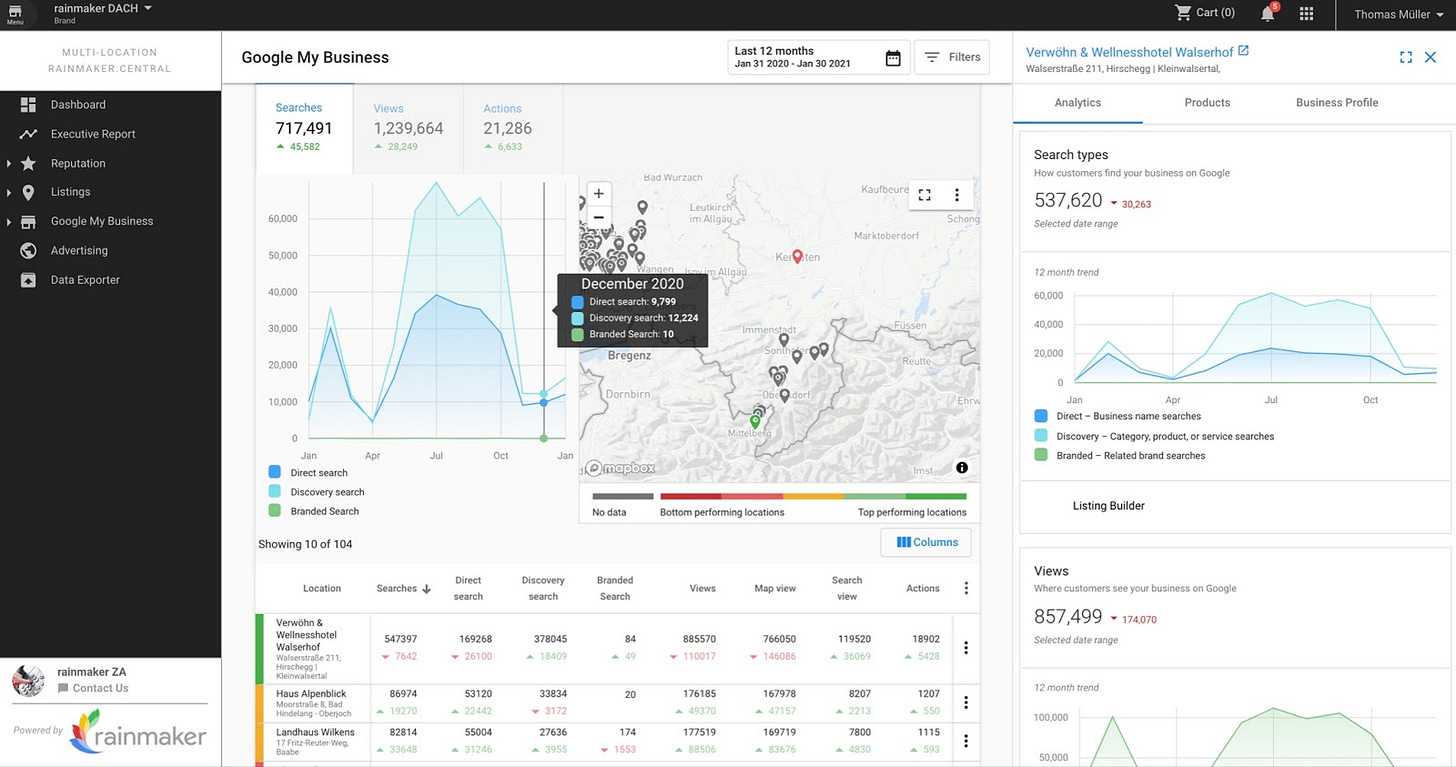Digitising hospitality
rainmaker travel is a traveltech provider for the tourism & hospitality industry founded in Namibia in 2016. As a social enterprise they have developed the first industry cloud for destinations and the companies within. This week we caught up with their founder, Thomas Mueller to learn more.
What challenge does rainmaker solve?
We enable SME tourism & hospitality companies and destinations to succeed by managing the digital aspects of their business.
Globally hospitality & tourism companies and destinations in general are facing a common challenge. The traveler has been digitised within the last decade and the pandemic has accelerated this digitisation.
At the same time, the tourism & hospitality industry did not digitise in the same way. In Africa, only 15% of them have a proper digital presence or use digital tools to provide their customers what they want and desire. Many still work on pen & paper or out of Excel sheets.
As a result these businesses are cut off from the digital world their customers are living in. They have literally forced travellers to make use of online travel agents (OTA’s), which today have become market behemoths to which tourism & hospitality companies pay between 60% and 80% of their revenue. Moreover they relinquish customer ownership to these OTA’s.
By being at the behest of these OTA’s, SME’s in particular dilute their own visibility, digital presence, reputation, communication and distribution which makes it ever more difficult for travellers to actually find them.
It is obvious that the value chain is broken and no longer economically sustainable within tourism & hospitality. Tourism was once a key solution to create prosperity in a destination, contribute to the UN Sustainability Goals and the destination's GDP. But with that much money leaking or not even reaching a destination, this is no longer the case.
When we launched in 2016, we started with the impact idea in our core DNA. We started as a social enterprise, or Zebra company as it is often called today. However, we are a for profit company and both approaches work well together.
What‘s the story behind the company?
I have 40 years of experience in IT. In the early 2000’s I entered the tourism & hospitality sector when I was working for various brands of Thomas Cook and TUI, two of the world’s largest travel companies. During this time I had the opportunity to live and work in eight countries which included a foray into Africa.
I have now been living in Africa for 12 years. It quickly became clear to me that there was a huge void in the hospitality industry. The existing value chains no longer worked. The way to move the industry forward would be through digitalisation. I immediately knew I had to do something about it. That is when I started rainmaker as a social enterprise in 2016.
How did you get rainmaker travel off the ground?
Up until today, rainmaker is entirely bootstrapped and only my own personal cash injection and our revenue generated have kept us afloat.
We have got some investor proposals from VCs in the US and Europe in recent years. However, they did not understand that we are an African company with our roots in Africa and that we are a social enterprise with a mission.
They either wanted us to move to San Francisco, London or Berlin as a company to grow. While they offered some significant amounts of money, we declined them all. They were not right for us, our mission and our DNA.
This has many advantages but also some disadvantages, obviously. The disadvantage is that you are always short of money and that you can’t move as fast and broad as you like. This sometimes can be very frustrating and even depressing. It really is a constant hustle and you go through many difficult situations.
But the huge advantage is that you need to think things through to the very end. You simply can’t afford any failure which you could easily do if you have a pile of money to throw at a problem.
That may solve a pertinent issue, but might not be the best long term investment into your architecture. The other advantage is that we could stick to our vision, mission and DNA of being an African company.
What went into building the early stage product?
We looked at the entire customer journey. Then we applied that into the needs of our customers to determine the type of products we needed to build.
This is how we came up with the 5 Stages of Success. A holistic methodology and managed service approach segmenting the customer journey in five building blocks: Visibility, Digital Presence, Reputation, Marketing & Advertising and Business Management & Distribution.
In the beginning everything was quite manual while we built technology to automate all segments as far as possible. With our approach of failing fast and often, we could constantly improve our standard operating procedures (SOPs) and the way things are been handled and fulfilled.
After enduring five tough years with many challenges across the board our hard efforts finally paid off. Today, we can onboard a new destination with like 1000+ businesses in a day or two without any hassle.
What’s your tech stack?
We are 100% cloud based, everything is either running in AWS or the Google Cloud Platform. Our Architecture is entirely serverless, organised in hundreds of micro services and built with an API first approach.
We never took the complex and expensive way of building native apps for either iOS or Android. On the back end we predominantly use node.js while on the frontend we use vue.js, angular.js, react, depending on the need. Our single point of truth data storage is a NoSql approach.
That way our platform is highly scalable from hundreds or even millions of businesses being onboarded.
Where do you currently operate?
We started in Namibia and shortly after launched in South Africa. We are now expanding into Europe, specifically the DACH region as well as Asia and North America.
The interesting thing is that countries like Germany, Austria and Switzerland are at least some 3-4 years behind the likes of South Africa and some other African countries when it comes to data usage and mobile adoption. So we are actually exporting African technology and business models to Europe.
What’s your business model?
The business model is a Platform as a Service (PaaS) model with a once-off setup fee. We provide our platform and services to either a destination or a tourism & hospitality business in a destination. When working with destinations we usually are getting approached by the tourism ministry, the tourism board (DMO) or a tourism & hospitality association.
Often we provide our platform and technology as part of a public-private partnership (PPP) in the destination. We build the local capacity and then make sure that the destination is able to operate sustainably and manage everything on their own.
What metric do you use to measure success and why?
The quality of the data we collect and disseminate. We obviously collect a lot of anonymized big-data and meta-data along the customer journey. This is also the data we provide the tourism ministry, tourism board or association in our destination dashboard.
It is a market intelligence dashboard that provides deep insights into the customer journey from the very first search all the way through the review and every step in between. This proves hugely valuable to our customers.
What’s the most useful tool you use in your business?
Google Workspace and Slack.
What do you love most about running rainmaker travel?
To see, feel and experience when a vision becomes reality after years of tough times, frustration, depression, hustle and challenges.
What’s the most important lesson you’ve learnt so far?
The approach of fail fast and often and everyday learning. A culture that doesn’t put failures under the rug when they are small, just for them to get bigger until one can’t solve them anymore.
That is what ordinary companies do and how people get conditioned. And that there is not a single day where you do not learn something new. If you have some of those days, you are already in a stand still and backward mode.
What are your views on the African tech ecosystem?
I always explain to my colleagues in Europe or elsewhere that they must not underestimate Africa. I firmly believe the MUSIC IS PLAYING IN AFRICA. We do have a bright future.
There is no other continent with such an innovative, entrepreneurial, young and willing crowd of people that have learnt to improvise and create something sophisticated with very little to start with.
Look at the fact that Lagos has become the Mecca of Fintech. The Silicon Cape initiative in South Africa and the many other initiatives in Kenya, Ghana, and Rwanda. There is a reason why the big guys such as Google, Amazon, SAP and others are investing heavily in Africa.
In the News 🚀
🇳🇬 Nigerian fintech software company, Appzone, has raised a $10 million Series A round.
🇬🇭 Twitter has chosen Ghana to serve as its African HQ. According to Twitter’s statement, their decision was based on three aspects: free speech, online freedom, and the open internet.
🇷🇼 Rwandan electric motorcycle company, Ampersand, closed a $3.5 million funding round from the Ecosystem Integrity Fund (EIF) in order to scale its operations.
🇿🇦 South African VC firm, Kalon Ventures, has secured additional capital from investors which pushes its assets under management to $13.7 million.






